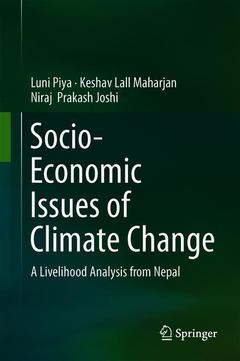Socio-Economic Issues of Climate Change, 1st ed. 2019 A Livelihood Analysis from Nepal
Auteurs : Piya Luni, Maharjan Keshav Lall, Joshi Niraj Prakash

Chapter 1. Introduction.
Chapter 2. Climate change and rural livelihoods in developing countries.
Chapter 3. Climate change in Nepal: Policy and programs.
Chapter 4. Conceptual and analytical framework.
Chapter 5. Chepangs: The community in focus.
Chapter 6. The Study Settings.
Chapter 7. Annual subsistence cycle: Integration of farming and gathering.
Chapter 8. Sources of livelihoods: A portfolio.
Chapter 9. Climate change: Perceptions and the determinants.
Chapter 10. Community vulnerability to climate change.
Chapter 11. Livelihood impacts of climate change and extreme events.
Chapter 12. Adaptation strategies and factors influencing the adaptation choices.
Chapter 13. Conclusion.
Luni Piya, PhD, Hiroshima University
Keshav Lall Maharjan, PhD, Professor, Hiroshima University
Niraj Prakash Joshi, PhD, Hiroshima UniversityPresents a multidimensional analysis of climate change integrating socio-economic and demographic data with meteorological and spatial data
Study conducted at the micro-spatial scale focusing comprehensively on the livelihood issues of a highly marginalized Chepang community residing in the remote rural Mid-Hills of Nepal
Combines quantitative and qualitative approaches of data collection and analysis, ensuring the research relevance to multidisciplinary readers
Date de parution : 03-2019
Ouvrage de 202 p.
15.5x23.5 cm
Disponible chez l'éditeur (délai d'approvisionnement : 15 jours).
Prix indicatif 52,74 €
Ajouter au panier


